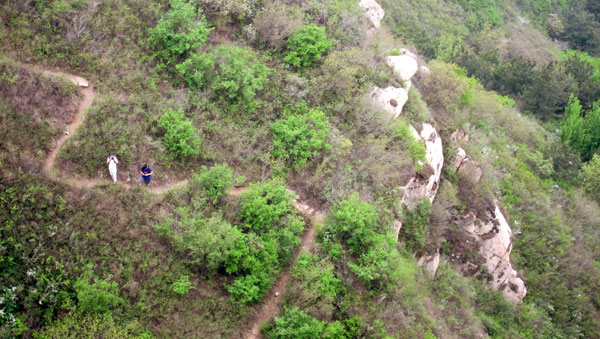Stepping it up with Beijing hikers
- by William Wang
 0 Comment(s)
0 Comment(s) Print
Print E-mail CRI, May 10, 2013
E-mail CRI, May 10, 2013
|
Beijing Hikers on the final ascent of Yinshan Mountain. [Photo: CRIENGLISH.com/William Wang] |
The claustrophobia of life in the grey capital has been known to suffocate the outdoorsy types who end up living in Beijing. But on a clear day, the mountains just beyond still coax and call, their little explored ridges and trails beckoning some away. I'm not talking about the Badaling and Mutianyu Great Wall sections, rammed with tourists. Somewhere out there are actual escapes, quiet valleys to clamber and peaks to summit.
Since 2001, Beijing Hikers has been organizing multiple trips every week to hiking destinations which would be tricky for the average Joe to discover. In addition, some particularly unique trips help fill the roster such as a hike by the light of the full moon, or a winter river hike where at points fish can be seen through meter thick ice.
Last Wednesday, I joined the group to check out their Silver Pagoda Loop, a nine kilometer ramble past two towns, a quarry, a Buddhist shrine and an impressive series of six-century-old Buddhist stupas.
After a two hour bus ride to the north east, 12 hikers and three staff stumbled out to blink in the hazy light. Everyone out was disappointed to find that roughly 60 kilometers away from Beijing, the air quality had improved but little. "On a clear day, you can see clear through to the Mutianyu Great Wall!" insisted Millicent Thapa, the self-proclaimed "craziest" guide of Beijing Hikers.
She soon scrambled off, leading the way through Haizi Village toward a humble shrine where she told short and entertaining bits of history. The multilingual American was bizarrely upbeat yet refreshingly sincere and laidback: an ideal guide. As she laid out the flags for the rest of the group to follow, she twittered about the local flora and fauna and the time she had to splint the leg of a woman who had the misfortune to trip and break her leg.
No such misfortune occurred on our hike. The hikes are categorized from 1 to 5, and this one was a 3 -- moderate. The webpage warned that a reason people might not like the trip is that "the hike is mostly flat, except for the last climb up to the top of the mountain behind the pagodas. The climb up is quite a tough way to finish!"
But even the flat sections were a barrage of pleasant scenery. The group happily plodded forwards, and it seemed only natural that people would discuss topics from cycle tour honeymoons to disease-ridden inflatable sex dolls.
Only as people started gasping along the final ascent of Yinshan Mountain did the bouncing banter fade away. At the summit lookout, people joyously flopped down and admired the view, so happy with their accomplishment that they ignored the hazy view: "Wow. Wow. This is amazing."
The descent down the front of the mountain was swift, with pit stops to ring a massive Buddhist bell, and take in a Tibetan stupa and an "ancient" Buddhist rock carving. "It's fake," decided Paul Meyer, a German man who was accompanying his parents. Most hikers seemed to agree.
The cultural highlight of the trip was the ruins of Fa Hua Temple. The temple buildings were destroyed long ago, but five tall pagodas and two stupas had survived the ravages of time and society. Particularly picturesque with the backdrop of mountains, cameras busily filled up their SD cards. A hiker couldn't ask for sweeter denouement.
Sue King from England joined the group for a second time. "[The first time] was really good, well-organized; we were well fed," she said. "There was an excellent, excellent restaurant at the end. So yeah we thought we'd come again." This trip, she particularly enjoyed the lack of crowds. "Haven't seen anybody else today, have we?" she quipped.
Meyer was satisfied to do this trip with his parents, even though he missed the freedom of hiking solo. "There's not a lot of things you need to organize yourself so if you don't have a lot of time and you don't know any good spots, it's good." he stated. "It's not cheap but it's still okay, I guess."
Cost is indeed a factor that can cause people to balk at joining. Most trips cost around 400 yuan per head. But all hikers recognize the value offered for the trips: unique destinations, qualified guides with first-aid training, transportation, water and snack. Organization is top-notch, so hikers would be hard pressed to get lost or left behind. And of course, many hikes conclude with a generous country style meal (with beer included). Really, if you want everything taken care of for you, and taken care of well, you could hardly do better.








Go to Forum >>0 Comment(s)